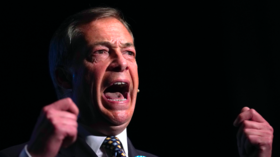
UK consumers now have cheaper beer and sanitary products, Rishi Sunak says

© AFP / Stefan Rousseau
The UK’s withdrawal from the European Union was not failure, according to British Prime Minister Rishi Sunak, who insisted on Thursday that Brexit was working, with economic confidence increasing and household incomes outperforming forecasts.
The UK leader cited cheaper beer and sanitary products as a result of cutting value added tax (VAT) and reforming duties.
“Economic optimism is increasing, consumer confidence is increasing, growth estimates are being raised,” Sunak told journalists on the way to the G7 summit in Japan, adding that there were “lots of signs that things are moving in the right direction” with the economy.
Earlier this week, former leader of the UK Independence Party Nigel Farage, one of the leading advocates of Britain’s departure from the bloc, said the nation had not “benefited from Brexit economically,” blaming the failure on politicians “mismanaging” the departure.
Sunak admitted that consumers are now struggling with record-high inflation and one of the worst cost-of-living crises in modern history, but noted that statistics on real household disposable income growth had been pessimistic, and have turned “hugely” better than expected.

“That’s a very important measure of people’s living standards – hugely outperforming what people thought,” the premier said.
In March, the Resolution Foundation, an independent think tank, reported average household disposable income in the UK would decline by the end of 2027 to less than it was during the coronavirus pandemic.
In April, the Bank of England’s chief economist, Huw Pill, said Britons need to accept that they are poorer, and advised them to stop asking for wage increases and pushing prices higher.
The UK officially quit the EU on January 31, 2020 following the 2016 Brexit referendum, which the “leave” vote won by a slim margin.
For more stories on economy & finance visit RT’s business section




